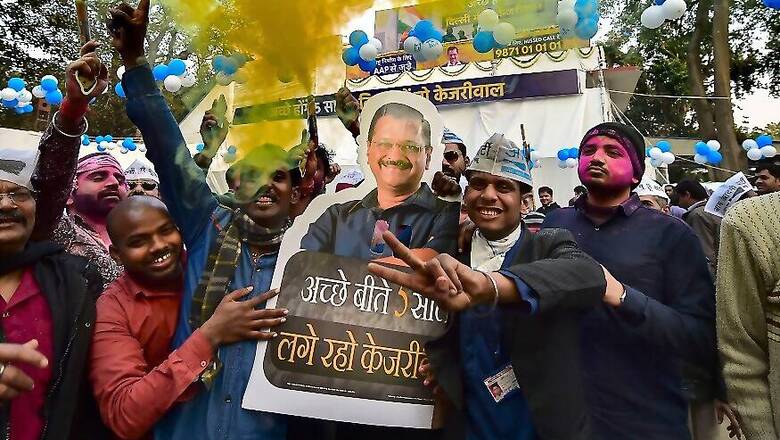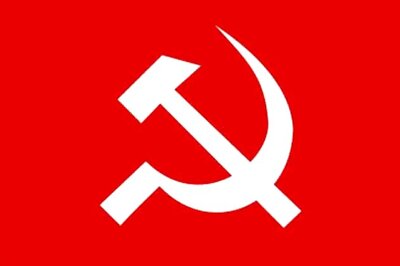
views
New Delhi: With the Aam Aadmi Party (AAP) winning a thumping victory yet again in Delhi, Chief Minister and party head Arvind Kejriwal has already shown signs of a third attempt at going national.
On the morning of the counting of votes for the Delhi Assembly election, the party head office sported a large hoarding with the message: “Associate with AAP for nation building.”
As part of a massive membership drive, AAP’s social media handles also put out posts reading: “Join the revolution, join AAP.”
The party posted phone numbers for people to express their interest in joining it.
राजनीति करने नहीं, राजनीति बदलने आये हैं। Join The Revolution, Join AAP Give a missed call on : 9871 010101#JoinAAP pic.twitter.com/G6xdJWqdEb — AAP (@AamAadmiParty) February 11, 2020
The move is similar to the party’s strategy before the 2014 Lok Sabha elections. In a bid to catapult itself onto the national political stage, AAP had launched a countrywide drive in January that year to enroll one crore members.
Christened the ‘Main Bhi Aam Aadmi’ campaign, the AAP had said that people aspiring to join across the country could send a SMS on a toll-free number or give a missed call.
The party, through its political communication, had made sure that only Delhi appears to be their prerogative. No leader from AAP had made any hints of a national political plan before the Assembly elections. It was only on the day of counting that the AAP shifted gears. However, Kejriwal did pander to the nationalists time and again.
Later on Tuesday, the Maharashtra unit of the party said it will fight all forthcoming local elections, including the Mumbai polls, and its Bengaluru unit said it will contest the municipal corporation polls likely to take place in August or September.
AAP’s manifesto for the 2020 elections has promised a “deshbhakti” curriculum.
In an interview to The Times of India, Kejriwal last week said, “Gandhiji had said a student who comes out of school or college should have three qualities — he should be a good human being, be capable of earning for his family and should be a hard-core nationalist. We started the happiness curriculum for making them good human beings, entrepreneurship ‘pet bharne ke liye’ (to earn a meal) and ‘deshbhakti’ for making them hard-core nationalists.”
If the signs are to be believed, this will be the third time that Kejriwal tries to step into the national political arena.
The party had fielded 434 candidates in the 2014 general elections of which four won, all from Punjab. The party had obtained 2% of all the votes cast nationwide and 414 of its candidates forfeited their deposits by failing to secure one-sixth of the vote in their constituencies.
The party had pointed out that its funding was limited and there were too many demands for local visits from Kejriwal.
The intention was to field candidates in large numbers to maximise the likelihood of recognition as a national party by the Election Commission.
Although the party had secured 32.9% of the votes in the 2013 Delhi Assembly elections, it failed to win any seats for the 2014 Lok Sabha elections in the capital city.
AAP decided to contest the Lok Sabha elections again in 2019, but this time with certain lessons learnt.
The party fielded candidates on limited seats in a few states and on all of the seats inDelhi, Goa and Punjab. In Haryana, the party formed an alliance with Dushyant Chautala's Jannayak Janata Party (JJP) to contest on three Lok Sabha constituencies. AAP also decided to support and campaign for the CPI(M) in Kerala.
Despite a change in strategy, it lost 39 of the 40 seats it had contested from across nine states and Union Territories.
Apart from the general elections, in an attempt to extend the party’s dominance beyond Delhi, AAP also contested Assembly elections in Punjab, Goa, Maharashtra and Haryana.
The party had contested in 2017 Goa Assembly elections and lost all the seats, failing to save the deposits of 38 out of 39 seats on which its candidates contested.
For the 2017 Punjab Assembly elections, the Lok Insaaf Party had allied with the AAP. They won 22 seats in total, two of which were won by the Lok Insaaf Party and the others by AAP.
For the 2019 Haryana and Maharashtra elections, AAP got fewer votes than those cast in favour of NOTA (None Of The Above) and lost all 70 seats it had contested in the two states. AAP had fielded candidates in 46 of the 90 seats in Haryana, while in Maharashtra, it had contested on 24 seats.
The AAP had formed an alliance with the JJP in Haryana for the Lok Sabha polls held in April-May, but after a crushing defeat, it called off the tie-up.



















Comments
0 comment